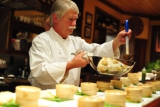
Fifty-Minute Classroom: Cooking by Description
Chef Adam Weiner challenges classes by instructing students to cook a certain food with no recipe and sometimes the wrong equipment required for execution. His response to the challenge: “Get it done.”

Chef Adam Weiner challenges classes by instructing students to cook a certain food with no recipe and sometimes the wrong equipment required for execution. His response to the challenge: “Get it done.”

Dr. Fred Mayo, CHE, CHT, directly addresses students about sound test-taking strategies to help build their confidence and reduce test-taking anxieties.

“Price (for education) is what you pay. Value is what you get.” -Warren Buffett

Millennials are choosing peanuts and peanut products for their nutritional benefits while enjoying them in sauces and smoothies. It’s not just PB&J anymore.

A thirst for knowledge and a varied background has lead DOLE Packaged Foods Corporate Chef Ken Shipton, CEC, on a career ride that fits his current position like a glove.

Instructing high school culinarians includes learning about international foods and a lesson on the fly in synchronized serving for students at southern Rhode Island’s Chariho Area Career and Technical Center.

An aging population and growing demand for healthcare facilities has lead to an increased need for culinarians to feed the seniors.

Culinary leadership should separate the interesting from the critical to determine forward thinking methodologies.

Chef Adam Weiner and mentor Chef Jesse Cool broaden the concept of buying local food to include selecting food that is freshly grown locally from known farms with greater biodiversity and sustainability.

Dr. Fred Mayo shares test creation tips and offers ways to reduce student test-taking anxiety. “A good test question is like a clean window; it does not get in the way of seeing what the student does and does not know.” Mary Ellen Weimer